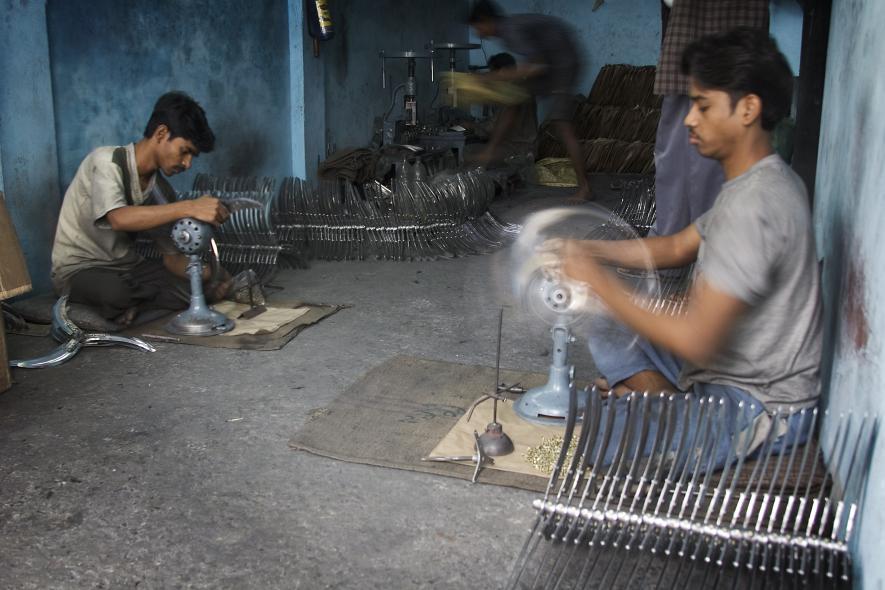Central Government’s Push Behind Suspension of Labour Rights in States?

Representational image. | Image Courtesy: Wikipedia
New Delhi: Over the past week, various states, including those ruled by the Bharatiya Janata Party (BJP) as well as those ruled by non-BJP political parties, are being held squarely responsible for drastic suspension of labour laws in the midst of the Covid-19 lockdown thereby stripping workers of their basic rights. However, it is increasingly being felt in certain political circles that it is actually the BJP-led National Democratic Alliance (NDA) government at the Centre that has been pushing through the lopsided reforms.
State governments that have made sweeping changes to labour laws recently, including Uttar Pradesh, Madhya Pradesh and Gujarat, are being ruled by the BJP. However, Congress-ruled states like Punjab and Rajasthan have also followed these states in introducing labour law reforms, albeit in lesser degrees. Similarly, the state government of Odisha, led by the regional party Biju Janata Dal (BJD), which at this point of time is neither directly aligned with the NDA nor the Congress, has also introduced certain changes in labour laws. All states have unequivocally advocated the need for labour reforms ostensibly to attract investments, boost revenues, generate employment and put the economy back on track following the Covid-19 pandemic. The laws will be temporarily held in abeyance for a period of a few months to a few years in different states as the case maybe.
It is noteworthy that rights of workers have been suspended despite Prime Minister Narendra Modi exhorting employers during the initial phase of the lockdown period not to cut down jobs.
Apart from other reforms, the increase in daily work hours from eight to 12 hours, as introduced first by Uttar Pradesh and later followed by Madhya Pradesh and other states, has received flak from several quarters. It has been argued that an increase in work hours will give employers the leeway to have the same levels of production through a lesser number of workers.
Beginning with Uttar Pradesh, which first suspended all but three labour laws in the state for a period of three years, reforms undertaken by various state governments ever since have been seen as suo motu decisions by their respective governments. On May 5, however, the Union Ministry of Labour and Employment headed by Cabinet Minister Santosh Gangwar had issued an advisory upon the state government of Andhra Pradesh asking it to “undertake labour law reforms on priority basis” in order to “address the challenges emerged due to COVID-19 pandemic”. The central government had also directed Andhra Pradesh to increase work hours “from 8 to 12 in a day to address Covid-19”.
Further, through the advisory, the YSR Congress Party-led state government headed by YS Jaganmohan Reddy has also been credited for undertaking a slew of labour law reforms in the past in tandem with “communications” issued by the central government. The advisory states that Andhra Pradesh has already increased the threshold of workers from 100 to 300 under the Industrial Disputes Act, 1947. It has also credited the state government for increasing the threshold under Contract Labour (Regulation & Abolition) Act, 1970 from 20 to 50 workers. Besides, it has further acknowledged the state government’s efforts at reforming the Factories Act, 1948 by increasing the threshold from 10 workers to 20 workers for units operating with power and from 20 workers to 40 workers for those operating without the aid of power.
It is not immediately clear whether the central government has issued similar advisories upon other states to expedite labour reforms in the backdrop of the Covid-19 pandemic. Union Labour Minister Santosh Gangwar did not respond to calls and text messages asking him whether similar advisories have been issued to other state governments as well.
Curtailment of rights of workers and labourers, as part of policy measures, is not anathema to the BJP which is in power at the Centre for the second consecutive term now.
In August 2014, soon after the BJP formed a coalition government at the Centre, the Rajasthan state government had amended four major labour laws making it easier for employers to hire and fire workers. The amendments also tightened the screws on collectivisation through the formation of unions. The amendments by Rajasthan, which at that time was being ruled by a BJP government headed by Chief Minister Vasundhara Raje Scindia, had been made to the Factories Act of 1948, the Industrial Disputes Act of 1947, the Apprentices Act of 1961 and the Contract Labour (Regulation & Abolition) Act of 1970.
“While the central government had carried out the experiment through Rajasthan in the year 2014, the BJP-ruled state of Uttar Pradesh has been chosen in the year 2020 for taking the lead in the experiment. Once the ordinance passed by the cabinet of UP state government gets an assent from the President of India, other states will no longer require to go to the central government for promulgating an ordinance of similar nature and scope,” said Amarjeet Kaur, General Secretary of the All India Trade Union Congress.
Labour laws fall under the Concurrent List of the Constitution of India thereby enabling both central and state governments to enact legislations on the subject.
The sweeping changes in labour laws are not only expected to hit hard the rights of unskilled and semi-skilled workers, but also upon those engaged in other sectors of the economy including Information Technology. Thousands of techies employed in software industries, for example, in Noida in Uttar Pradesh are expected to bear the brunt of the reforms like their counterparts in IT hubs in other states where laws have been similarly changed.
“The propensity towards arbitrary terminations of service is expected to increase in the IT sector since the Industrial Disputes Act has been suspended for a period of three years. It could lead to mass terminations without any accountability. Those employed in Business Process Outsourcing (BPO) industries or in telecalling firms also stand to be affected by terminations. Media personnel will also be affected since the Working Journalists Act has also been suspended. There will be no channel for workers to enforce their rights or seek remedies,” said Maitreyi Krishnan of the All India Central Council of Trade Unions.
Trade and labour unions have said in no uncertain terms that the sole purpose of the labour reforms is to ensure profits for the employer at the cost of workers. Prime Minister Narendra Modi has also, in the recent past, repeatedly stressed upon the role of wealth accumulators in nation building.
In a speech delivered on May 23, 2019 soon after BJP swept the Lok Sabha polls for a second time in a row, Narendra Modi said that only two castes will remain in India – the poor and those who contribute whatever little to free the country from poverty. Less than a couple of months later, in his address to the nation from the ramparts of the Red Fort on the occasion of Independence Day on August 15, the Prime Minister reiterated that wealth creators should not be eyed with suspicion but be given respect and pride of place in the society.
In yet another perceived attempt at curtailment of rights of workers, the central government has, in a communication issued on May 5, asked the Karnataka state government to limit the jurisdictional power of farmers’ marketing committees. The Union Ministry of Agriculture and Farmers Welfare has, vide the letter, directed Karnataka to reduce the role of Agricultural Produce Marketing Committees in mandis thereby snatching bargaining powers held by farmers over their produce.
“By snatching away the right of collective bargaining from workers, governments are absolving themselves from constitutional duties. By suspending all major labour laws, governments have totally dissociated themselves from disputes between workers and their management. It leaves a deep psychological impact on the working class which has not only been left to fend for itself without any rights but is also being forced to be grateful to those who offer employment,” said Bengaluru-based lawyer Clifton D’ Rozario.
Also watch: Unpaid, Hungry and Helpless: MSME Workers In Crisis
The writer is an independent journalist.
Get the latest reports & analysis with people's perspective on Protests, movements & deep analytical videos, discussions of the current affairs in your Telegram app. Subscribe to NewsClick's Telegram channel & get Real-Time updates on stories, as they get published on our website.
























